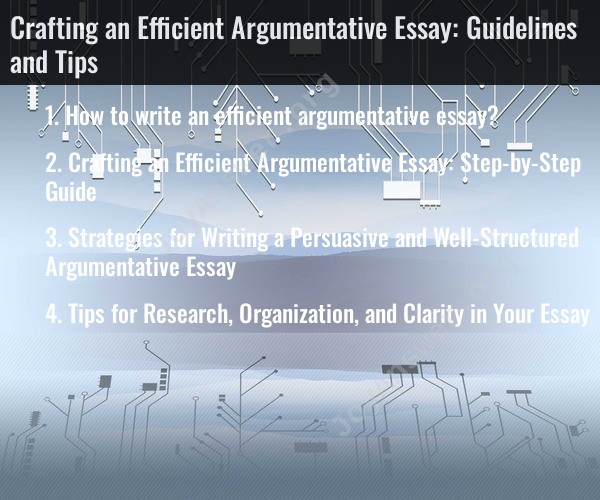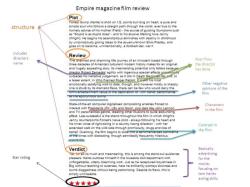How to write an efficient argumentative essay?
Writing an efficient argumentative essay requires careful planning, thorough research, and a clear structure. Here are step-by-step guidelines and tips to help you craft a compelling argumentative essay:
1. Choose a Strong Topic:
- Select a topic that is debatable and has two or more opposing viewpoints.
- Ensure that your topic is of current relevance and interest.
2. Conduct Research:
- Gather information from reputable sources, including books, academic journals, articles, and credible websites.
- Take detailed notes and cite your sources properly.
3. Understand the Argument:
- Clearly define your stance on the issue.
- Understand the main points and arguments of the opposing side.
4. Develop a Thesis Statement:
- Create a concise and well-defined thesis statement that presents your main argument.
- Your thesis statement should appear in your introduction.
5. Outline Your Essay:
- Create an outline that includes the introduction, body paragraphs, and conclusion.
- Organize your ideas logically and ensure a smooth flow of information.
6. Write the Introduction:
- Start with a hook to grab the reader's attention. This can be a quote, a startling fact, or a rhetorical question.
- Provide background information on the topic and lead to your thesis statement.
7. Craft Strong Body Paragraphs:
- Each body paragraph should focus on a single point that supports your thesis.
- Start with a clear topic sentence that introduces the main idea of the paragraph.
- Provide evidence, examples, statistics, and quotes to support your argument.
- Address counterarguments and rebut them to strengthen your case.
- Use transition words to ensure a smooth transition between paragraphs.
8. Maintain a Formal Tone:
- Use a formal and academic tone throughout your essay.
- Avoid emotional language or personal anecdotes unless they are relevant to your argument.
9. Cite Your Sources:
- Properly cite all the sources you used in your essay. Follow a recognized citation style (e.g., APA, MLA, Chicago).
- Include a works cited or references page at the end of your essay.
10. Write a Strong Conclusion:- Summarize your main points and restate your thesis.- Provide a call to action, make a prediction, or offer a solution to the issue.- Leave a lasting impression on your reader.
11. Revise and Proofread:- Review your essay for clarity, coherence, and conciseness.- Check for grammar, spelling, and punctuation errors.- Seek feedback from peers or teachers, and consider their suggestions for improvement.
12. Final Check:- Ensure your essay meets the requirements of the assignment, such as word count and formatting.- Review the essay to make sure it effectively presents your argument and persuades the reader.
13. Title and Introduction Last:- It's often helpful to write your essay's title and introduction after you've completed the main body of the essay. This allows you to better introduce and summarize the content.
14. Take a Break:- Step away from your essay for a while, if possible, and return to it with fresh eyes for a final review.
Remember that an efficient argumentative essay is not solely about expressing your opinion but also about presenting a well-researched and well-structured argument supported by evidence. It should engage readers, address counterarguments, and make a clear and compelling case for your viewpoint.
Crafting an Efficient Argumentative Essay: Step-by-Step Guide
To craft an efficient argumentative essay, follow these steps:
- Choose a topic. Choose a topic that you are passionate about and that you have some knowledge of. This will make it easier for you to write a persuasive essay.
- Develop a thesis statement. Your thesis statement is the main argument of your essay. It should be clear, concise, and arguable.
- Gather evidence. Gather evidence from credible sources to support your thesis statement. Evidence can include facts, statistics, expert opinions, and personal experiences.
- Organize your essay. Once you have gathered your evidence, organize it into a logical argument. Your essay should have a clear introduction, body paragraphs, and conclusion.
- Write your essay. Start by writing a strong introduction that introduces your topic and thesis statement. Then, write body paragraphs that each support your thesis statement with evidence. Finally, write a conclusion that summarizes your main points and reiterates your thesis statement.
Strategies for Writing a Persuasive and Well-Structured Argumentative Essay
Here are some strategies for writing a persuasive and well-structured argumentative essay:
- Be clear and concise. Make sure that your thesis statement and main points are clear and easy to understand. Avoid using jargon and overly complicated language.
- Be specific. When providing evidence to support your thesis statement, be as specific as possible. Avoid making general statements that are not supported by evidence.
- Be fair and objective. Consider all sides of the issue and present a balanced argument. Avoid making personal attacks or using emotionally charged language.
- Use transition words. Transition words help to connect your ideas and create a logical flow in your essay. Common transition words include "however," "therefore," "in addition," and "consequently."
- Proofread your essay carefully. Before you submit your essay, proofread it carefully to catch any errors in grammar, spelling, and punctuation.
Tips for Research, Organization, and Clarity in Your Essay
Here are some tips for research, organization, and clarity in your argumentative essay:
- Research your topic thoroughly. Make sure that you have a good understanding of the issue before you start writing. Read articles, books, and other credible sources to gather information.
- Take notes as you research. This will help you to keep track of your information and to organize your thoughts.
- Create an outline. An outline will help you to organize your thoughts and to ensure that your essay has a logical flow.
- Use evidence to support your claims. Don't just make assertions; back them up with evidence from credible sources.
- Write in a clear and concise style. Avoid using jargon and overly complicated language.
- Proofread your essay carefully. Make sure to check for any errors in grammar, spelling, and punctuation.
By following these tips, you can write an efficient, persuasive, and well-structured argumentative essay.











